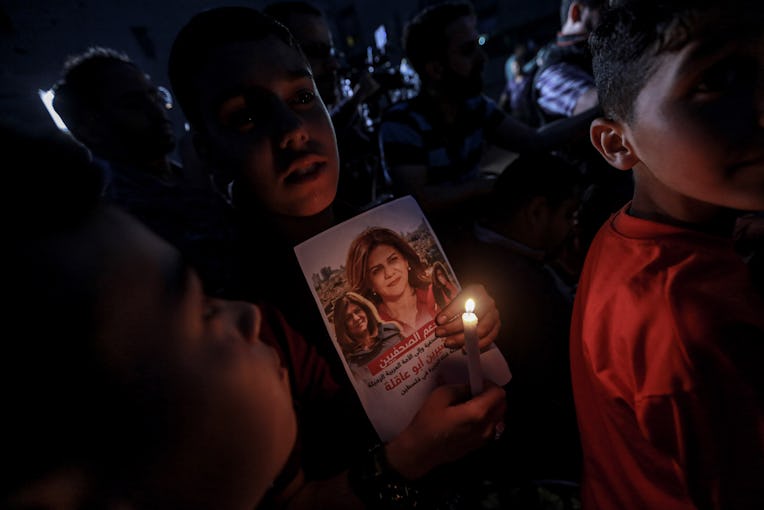The Media Has a Difficult Time Saying Israeli Forces Killed Shireen Abu Akleh
The veteran Al Jazeera journalist, who died Wednesday, deserves better

On Wednesday, veteran Palestinian-American journalist Shireen Abu Akleh was killed by Israeli gunfire while covering Israeli raids in the city of Jenin. As one of Al Jazeera’s field correspondents, Abu Akleh rose to prominence for her coverage of the second Palestinian Intifada. As her obituary in the New York Times notes, Akleh “became a household name among Palestinians and Arabs across the Middle East, inspiring many to follow in her path.”
While the military murder of a journalist usually sparks outcry among media outlets, the killing of Shireen Abu Akleh has not. In fact, just a cursory look at how it has been covered would make it seem as though Abu Akleh died under mysterious circumstances during ill-defined “clashes” between Palestinian and Israeli forces, instead of being brutally murdered by the latter.
Other journalists on the scene, including Al Jazeera producer Ali al-Samoudi — who was also shot by Israeli forces — emphasized to Al Jazeera that there was no presence of Palestinian fighters, saying, “We were going to film the Israeli army operation and suddenly they shot us without asking us to leave or stop filming.” Another journalist present, Shatha Hanaysha, confirmed to Al Jazeera that all journalists present were wearing press vests and helmets saying, “The [Israeli] occupation army did not stop firing even after [Abu Akleh] collapsed. I couldn’t even extend my arm to pull her because of the shots being fired. The army was adamant on shooting to kill.”
And yet, the now-changed New York Times headline for Akleh’s aforementioned obituary simply said she “died” while also obfuscating the contents of an Al Jazeera statement in a now-deleted tweet. (“Died” has now been changed to “killed” in the headline.)
The Associated Press also could not follow their own guidelines set just two years prior regarding the clarity of language when reporting on state violence:
In another especially egregious deleted tweet, Forbes said Abu Akleh “died after being hit in the head with a bullet,” a phenomenon also known as being fatally shot in the head, or murdered.
Israeli military spokesman Ran Kochav told Army Radio, “Even if soldiers shot at — or, God forbid, hurt — someone who was not involved, this happened in battle, during a firefight, where this Palestinian is with the shooters. So this thing can happen,” and described the unarmed Abu Akleh as being “armed with cameras.” In a statement, Israeli Prime Minister Naftali Bennett said the murder happened during an IDF counterterrorism raid at which “armed Palestinians shot in an inaccurate, indiscriminate and uncontrolled manner.” This claim is false, according to multiple eyewitnesses who spoke to the Washington Post.
“There were no fighters where we were, none at all,” Samudi told the Post. “We don’t put ourselves in the line of fire. Whatever the Israeli army says for us to do, we do. They shot at us directly and deliberately.”
Strange how that fact is difficult for the media to communicate about the death of one of their own.